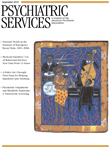Recovery Is Up to You, a peer-run course
Research has shown that peer-led support groups increase the social network of participants and offer them acceptance, support, understanding, empathy, and a sense of community. The presence of role models makes participants more hopeful and optimistic about their future and stimulates them to develop their own coping and problem-solving skills. Compared with traditional care providers, peers can provide more empathic support and make participants feel more comfortable about discussing experiences and feelings. Peers also may have more influence on clients' attitudes, values, and behaviors.
The peer-run course Recovery Is Up to You was developed in 1996 in the Netherlands by clients and two mental health professionals for people with major psychiatric problems. Groups are led by two trained course instructors who are in an advanced state of their recovery process and are prior course participants. They closely follow a standardized manual and workbook. The course consists of 12 weekly two-hour sessions. Each session has the same structure and is organized around a specific, recovery-related theme. Examples of themes are personal experiences of recovery, making choices about care or daily problems, and getting social support. Themes are discussed in a group setting, individuals share their experiences with the group, and skills are practiced. Important elements of the course are the presence of role models, psychoeducation and illness management, learning from each other's experiences, social support, and homework assignments.
Between 2006 and 2008, a randomized controlled trial was conducted to evaluate the effects of the course. Recruitment of participants (N=333) took place at 13 mental health institutions and client organizations in the Netherlands. Inclusion criteria were presence of serious psychiatric problems, being "in recovery" after having experienced major life disruptions, being prepared to take more responsibility, ability to discuss experiences with others, and ability to speak and read Dutch. Participants were excluded if they had florid psychotic symptoms, major addiction problems, or thoughts of suicide.
The feasibility of the course was evaluated by semistructured interviews. Of 38 groups, all of which had their own peer instructors, 37 course instructors were interviewed. In addition, 61 participants were interviewed, including those who had completed the course or who had dropped out. To this end, one course instructor and one or two participants of each group (depending on the group size) were randomly selected after completion of each 12-week course. In addition, course instructors filled out a checklist after each session, indicating their protocol compliance and their satisfaction with and opinion on process-related aspects. Thirty-eight 12-week courses were evaluated; the mean number of participants was seven, and the mean number of attended sessions was nine.
The results showed that most participants felt inspired and supported by the course instructor. Participants reported having received social support and personal attention from the other participants. Organizational aspects, such as information about the course, topics, and workbook, were also judged very positively by most participants and by the course instructors. About half of the participants felt free and sufficiently safe to discuss feelings and reported that they felt accepted by other participants. Moreover, the role modeling provided by the course instructors and the group process and course material were mentioned as important factors in recovery.
Course instructors noted in their evaluation interviews that they felt they had successfully stimulated and guided the group process. They indicated the ideal group size to be about seven or eight participants. Checklists showed high protocol adherence and no major problems with adherence to structure, content, goals, and time investment in the sessions. Generally, the atmosphere in the groups was positive. The mean number of dropouts per course group was two. Main reasons for dropout were personal or family problems, mental or general medical illness, and unmet expectations of the course or lack of readiness for the course.
Results further indicated that the ideal environment for conducting the course is a quiet room and safe environment. To prevent dropout, an intake interview is recommended in which details about the course are given and expectations of the participant are discussed. Furthermore, supervisors who provide coaching and encouragement to the course instructors also may contribute to the success of the course.
In conclusion, Recovery Is Up to You is easy to implement because of its structured workbook and manual. The positive experiences with the course, large number of participants, clarity of the course material, and high protocol adherence among course instructors showed that the course is a promising tool. Moreover, it could provide many people the opportunity to make an active start with their recovery process.



